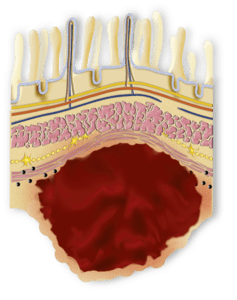GIST


It is estimated that approx. 1-1.5 out of 100.000 persons develop GIST per year. In other words, the chances of any individual being diagnosed are 1-1.5 in 100,000. However, there is some uncertainty as figures vary significantly between healthcare systems. Although the majority of patients are diagnosed between the ages of 55 to 65, GIST is also found among younger adults and children. These are called pediatric GISTs and are often found to be “wildtype” in character. This means that, unlike “normal” GISTs, they are not liable to mutate.
 Unfortunately, GIST often go unnoticed in early stages because they often grow without causing symptoms. Therefore, those tumors grow large before they are diagnosed and approx. half of all patients already have metastases (primary tumor has spread to other distant sites in the body). GIST metastases can usually be found in the liver, the peritoneum, or in the abdomen. Only rarely they can also affect other organs such as the lungs, bones, brain, or lymph nodes.
Unfortunately, GIST often go unnoticed in early stages because they often grow without causing symptoms. Therefore, those tumors grow large before they are diagnosed and approx. half of all patients already have metastases (primary tumor has spread to other distant sites in the body). GIST metastases can usually be found in the liver, the peritoneum, or in the abdomen. Only rarely they can also affect other organs such as the lungs, bones, brain, or lymph nodes.
GIST occurs (as do many cancers) because of a breakdown in the normal interactions between the body’s cells, which ensure that they replenish themselves, while the “old” cells die off. This is done by signals sent to receptors on the cells, giving the appropriate instructions. When this process fails, the cells just keep growing, forming a tumour. There are two main growth factor receptors, genes, called KIT and PDGFRA. In 90 – 95% of GIST patients, mutations in one of these genes can be detected and it is these mutations that cause the uncontrolled cell division leading to cancer. A vital part in determining the most appropriate way of treating any particular GIST is to discover the type of mutation.
